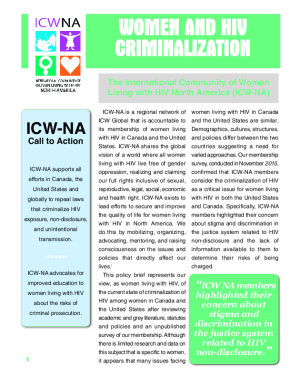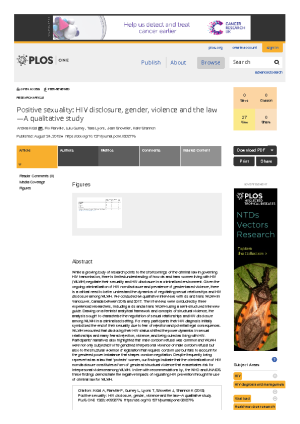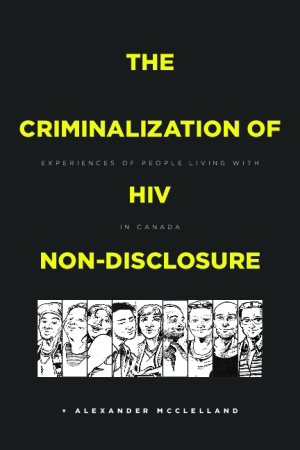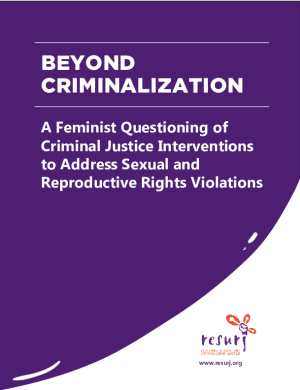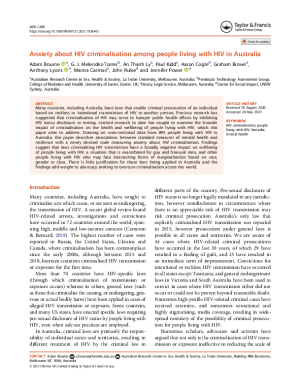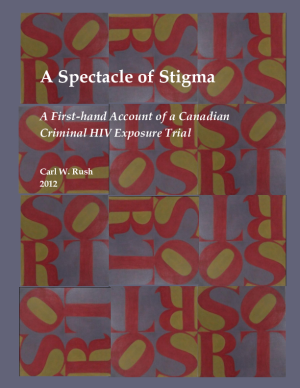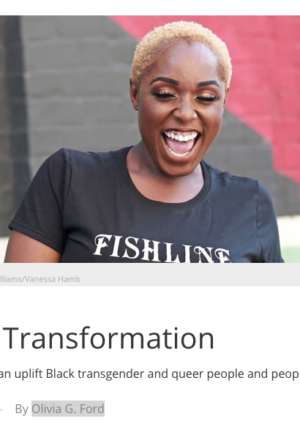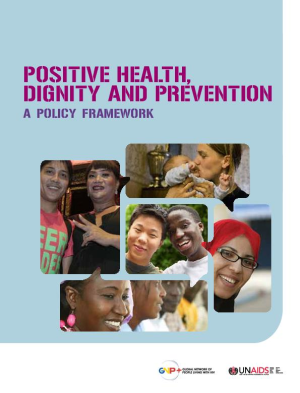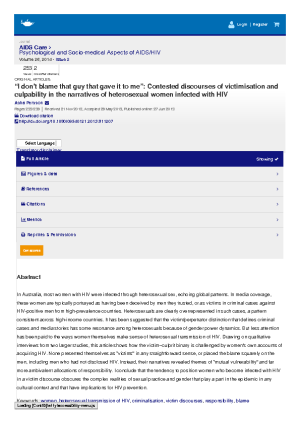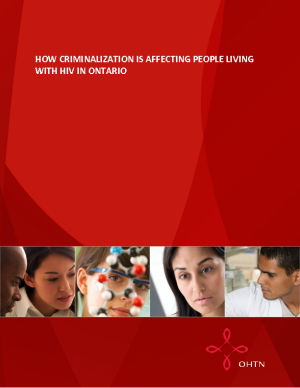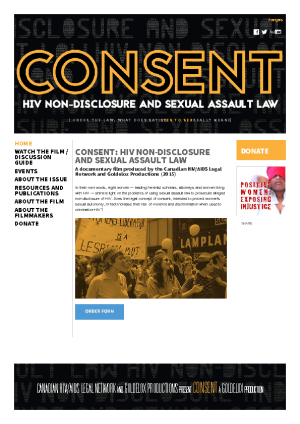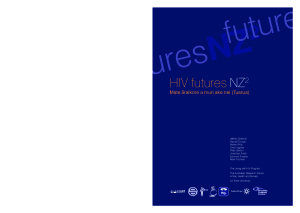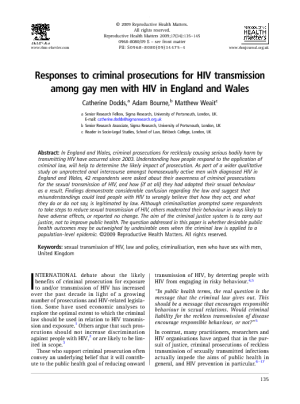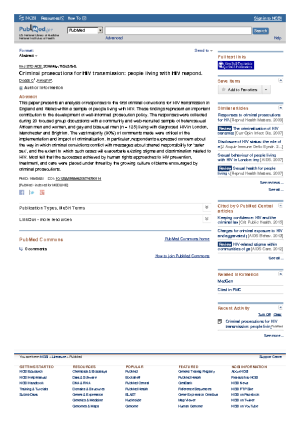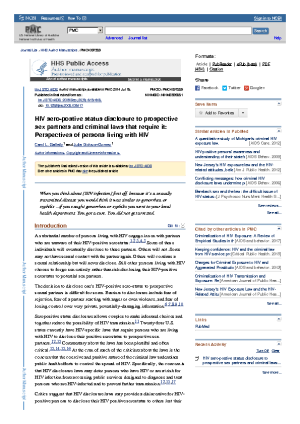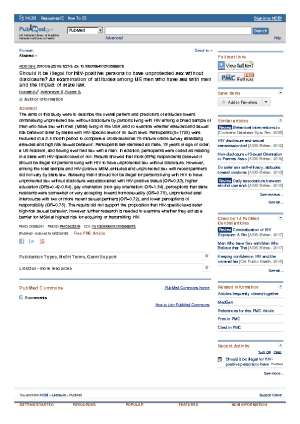This policy brief represents the view, as women living with HIV, of the current state of criminalization of HIV among women in Canada and the United States after reviewing academic and grey literature, statutes and policies and an unpublished survey of membership. ICW-NA members highlighted their concern about stigma and discrimination in the justice system related to HIV non-disclosure.
Understanding views of affected communities
There are many ways to undertake advocacy but most effective advocacy requires strong community support. The research below was undertaken to get a better understanding of community views on HIV criminalisation: knowledge to form the basis of discussions to build a strong advocacy base.
Through our eyes
Photo essay drawing on photographs and narratives created as part of an ongoing community-based photo-voice project visually exploring the gendered dimensions of HIV stigma, disclosure, and criminalization among diverse groups of women and transgender people living with HIV in Vancouver, Canada
Positive sexuality: HIV disclosure, gender, violence and the law—A qualitative study
Drawing on a feminist analytical framework and concepts of structural violence, this analysis sought to characterize the negotiation of sexual relationships and HIV disclosure among Women Living with HIV (WLWH) in a criminalized setting. Researchers conducted 64 qualitative interviews with cis and trans WLWH in Vancouver, Canada between 2015 and 2017. Despite frequently being represented as a law that ‘protects’ women, the study findings indicate that the criminalization of HIV non-disclosure constitutes a form of gendered structural violence that exacerbates risk for interpersonal violence among WLWH. In line with recommendations by, the WHO and UNAIDS these findings demonstrate the negative impacts of regulating HIV prevention through the use of criminal law for WLWH.
The Criminalization of HIV Non-Disclosure – Experiences of people living with HIV In Canada
This is the first known qualitative research study in Canada examining the phenomena of criminal and public health charges for HIV non-disclosure from the perspectives of those who have lived it.
The project examined the experiences of people living with HIV who were charged, prosecuted, or threatened with criminal and public health charges in Canada because they had been alleged to not tell sex partners of their HIV-positive status. The project was conducted between January 2016 to January 2019.
Beyond Criminalization: A Feminist Questioning of Criminal Justice Interventions to Address Sexual and Reproductive Rights Violations
The report presents the findings of the desktop research lead by the global south feminist alliance RESURJ, (Realizing Sexual and Reproductive Justice), as part of the alliance’s leadership work on the shortcomings and limitations of penal policies in addressing sexual and reproductive rights violations. The aim of the review and this analytical report is to strengthen RESURJ’s evidence base on sexual and reproductive justice and to further engage with diverse feminists and groups to reimagine alternatives to criminalized approaches, alternatives that put human rights and justice at the center.
Anxiety about HIV criminalisation among people living with HIV in Australia
Drawing on cross-sectional data from 895 people living with HIV in Australia, this paper describes associations between standard measures of mental health and resilience with a newly devised scale measuring anxiety about HIV criminalisation. Findings suggest that laws criminalising HIV transmission have a broadly negative impact on wellbeing of people living with HIV, a situation that is exacerbated for gay and bisexual men, and other people living with HIV who may face intersecting forms of marginalisation based on race, gender or class.
General Comments No.1 on Article 14 (1) (d) and (e) of the Protocol to the African Charter on Human and Peoples’ Rights on the Rights of Women in Africa
The Protocol to the African Charter on Human and Peoples’ Rights on the Rights of Women in Africa (the Maputo Protocol) is the first international legally binding human rights instrument to recognize the intersection between women’s human rights and HIV. In Article 14 (1) (d) and (e), the Maputo Protocol lays down women’s right to self-protection and to be protected from HIV infection, as well as their right to be informed of their HIV status and the HIV status of their partners in accordance with international standards and practices in force. As such, the Maputo Protocol is therefore, in practice, an important tool towards the alleviation of the disproportionate effect of the HIV pandemic on the lives of women in Africa. Even though considered as a landmark, the provisions of the Maputo Protocol on HIV are not very explicit on the measures to be taken by States Parties to ensure the full implementation of women’s rights to sexual and reproductive health. In order to meet this objective, the African Commission on Human and Peoples’ Rights (the Commission) adopted these General Comments on Article 14 (1) (d) and (e) at its 52nd Ordinary Session held from 9 to 22 October 2012 in Yamoussoukro, Côte d’Ivoire.
True Not Crime Story
Series of 4 videos from criminalisation survivors sharing their story to help others avoid their unfair experiences with the criminal justice system and HIV stigma. The videos are meant as a reminder of why these harmful HIV laws that still exist in over 30 states need to be modernised.
A Spectacle of Stigma
A First-hand Account of a Canadian Criminal HIV Exposure Trial
Positive Transformation
Toni-Michelle Williams, the executive director of the Solutions Not Punishment Collaborative (SNaP Co.), a Black trans- and queer-led organization working to build safety, leadership and political power, explores alternatives to the historically violent and biased U.S. policing system—including restorative and transformative justice models.
Impact of Canadian human immunodeficiency virus non-disclosure case law on experiences of violence from sexual partners among women living with human immunodeficiency virus in Canada: Implications for sexual rights
Study measured the reported impact of HIV non-disclosure case law on violence from sexual partners among women living with human immunodeficiency virus in Canada. Findings bolster concerns that human immunodeficiency virus criminalisation is a structural driver of intimate partner violence, compromising sexual rights of women living with HIV. HIV non-disclosure case law intersects with other oppressions to regulate women’s sexual lives.
Positive Health, Dignity and Prevention: A Policy Framework
Positive Health, Dignity and Prevention highlights the importance of placing the person living with HIV at the centre of managing their health and wellbeing. The Positive Health, Dignity and Prevention Framework requires a concerted multisectoral effort to work towards removing punitive laws and passing more laws that support and enable policies in favour of expanding programmes proven to reduce new HIV infections while protecting the human rights of people living with HIV and those who are at higher risk of exposure to the virus.
“I don’t blame that guy that gave it to me”: Contested discourses of victimisation and culpability in the narratives of heterosexual women infected with HIV
Considers how heterosexual women living with HIV make sense of their HIV acquisition, challenging the victim–culprit binary. None of the women interviewed presented themselves as ‘victims’ in any straightforward sense or placed the blame squarely on the men who likely infected them, including men who had not disclosed. Instead, the women’s narratives revealed themes of “mutual vulnerability” and far more ambivalent allocations of responsibility. The tendency to position women who become infected with HIV as ‘victims’ obscures the complex realities of gender and sexual practice.
How Criminalization is Affecting People Living with HIV in Ontario
Examines how people living with HIV perceive the law and the legal obligation to disclose serostatus to prospective sexual partners. Notes perceptions of a changing public climate resulting from the increasing prominence of criminal discourses applied to HIV.
Consent: HIV non-disclosure and sexual assault law
Features eight experts in HIV, sexual assault and law raising many questions about HIV-related legal developments in Canada. (28 min)
HIV Futures New Zealand (Mate āraikore a muri ake nei)
Notes that the current legal situation has led to discomfort and uncertainty around relationships, with 82% of PLHIV surveyed saying the current legal situation has limited their ability to form new relationships.
Responses to criminal prosecutions for HIV transmission among gay men with HIV in England and Wales
Considers respondents’ awareness of HIV prosecutions and how they have adapted their sexual behaviour as a result. Demonstrates considerable confusion regarding the law, suggesting misunderstandings could lead people with HIV to wrongly believe that how they act, and what they do or don’t say, is legitimated by law. Although criminalisation prompted some to take steps to reduce risk of HIV transmission, others moderated their behaviour in ways likely to have adverse effects, or reported no change.
Criminal prosecutions for HIV transmission: people living with HIV respond
Considers how people with HIV responded to the first criminal convictions for HIV transmission in England and Wales. The vast majority were critical of criminalisation, expressing concern that prosecutions conflict with ‘safer sex’ shared responsibility messaging, and exacerbate existing stigma and discrimination. Most felt a growing culture of blame undermined the successes achieved by HIV- human rights approaches.
HIV seropositive status disclosure to prospective sex partners and the criminal law that require it: Perspectives of persons living with HIV
Reports on HIV-positive persons’ focus group discussions about Michigan’s HIV disclosure law. Themes included perceived responsibility to prevent infection, concern about unwanted secondary disclosure of HIV-positive status, fear of being falsely accused of violating HIV disclosure law, and perceived vulnerability of HIV-positive persons within the US legal system. Although many agreed with the purpose of the HIV disclosure law, there was considerable concern about the negative impact of the law on persons living with HIV.
Should it be illegal for HIV-positive persons to have unprotected sex without disclosure? An examination of attitudes among US men who have sex with men and the impact of state law
Describes the overall pattern and predictors of attitudes toward criminalizing unprotected sex without disclosure by people with HIV. Examines whether attitudes and sexual risk behaviours differ in states with or without HIV-specific laws. Found most respondents believed it should be illegal for persons living with HIV to have unprotected sex without disclosure, however, attitudes did not vary by state law, suggesting HIV-specific laws do not deter high-risk sexual behaviour.
